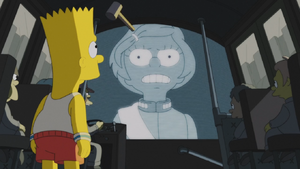
The Last Traction Hero/References
Wikisimpsons - The Simpsons Wiki
|
|||||||||
|
|
|
Cultural references
- The title of the episode is a reference to the movie Last Action Hero.
- The tableau of the Simpsons in the couch gag is an homage to the painting The Third of May 1808 by Francisco Goya.
- The Rich Texan calls Mr. Burns "Davy Crockett" ironically, since Crockett was a renowned hunter and Burns can't shoot a sedated quail that is still moving.
- After the quail has been rendered unconscious with ether and Burns shoots it, the recoil of his rifle sends him bouncing backwards across the pond like a skipping stone as he curses the surface tension.
- "Mr. Big Stuff" by Jean Knight is heard when Homer takes advantage of Mr. Burns' belongings.
- The song the parrots sing in Mr. Burns' office is "Wiki-Waka Liki-Laka", written by Bill Odenkirk with lyrics by Chris Ledesma. The song is a parody of the theme for the Walt Disney's Enchanted Tiki Room, "The Tiki Tiki Tiki Room".
- Abe says he participated in the cast of the Shelbyville Players production of the musical Pippin.
- The song playing after the black and white scene with the puzzle is "We'll Meet Again" by Vera Lynn.

Bart's throwing a sledgehammer at the screen showing Lisa's face as "Big Brother" is a reference to the Macintosh commercial "1984"
- The sequence that ends with Bart throwing a sledgehammer at the screen showing Lisa's face as "Big Brother" is a reference to the commercial "1984", aired during the Super Bowl XVIII that introduced the Macintosh computer.
- It was referenced in "MyPods and Boomsticks" too.
- The uniform she wears later as bus monitor is the same as the one she wore as the imagined "Big Brother".
- The uniform and hairstyle are references to Tilda Swinton's character Minister Mason in the movie Snowpiercer.
- Mr. Burns tells his lawyers that being told to omit mention of his hounds is "like telling pitcher Three-Finger Brown he can't play for the Brooklyn Tip-Tops," which existed 1914-1915. Mordecai "Three-Finger" Brown did in fact pitch for the Tip-Tops in 1914 and was elected to the Baseball Hall of Fame in 1949.
- Talking with Smithers, Marge says she can see why so many straight women in movies have gay friends, "like Princess Leia and C-3PO".
- Mr. Burns owned the Nuclear Power Plant that is infamous for the Chernobyl disaster.
- The Tragic School Bus is a reference to The Magic School Bus.
- The music heard during the "Tragic Bus" montage and again during the end credits is "Night on Bald Mountain" by Modest Mussorgsky.
- The book Callback Mountain is a reference to the book On Call Back Mountain by Eve Bunting.
- Lisa's corrections to Miss Hoover's incorrect American History answers included:
- D.C. stands for District of Columbia.
- Seward's Folly, a term used by opponents of the United States of America's purchase of Alaska from Russia in 1867. U.S. Secretary of States William H. Seward in the Andrew Johnson presidential administration lead the negotiations.
Trivia
- As of this episode, Kevin Michael Richardson is credited as also starring, having been credited as special guest voice previously.
- The title of the episode is also a reference to the The Itchy & Scratchy Show's episode of the same name.
- Instead of on TV after the couch gag, the credits for the episode were shown on the Power Plant parking lot.
- When Homer sings sUe S.A. sUe S.A., he's holding an American flag with Damages written on it. In the trailer, for the episode it wasn't shown.
Goofs
- The sign "Reserved for Montgomery Burns" only appears when Carl mentions it.
- Bart's signature, "Father, good luck", on Homer's cast disappear between scenes.
- Skinner's filing cabinet misses drawers for I and J.
